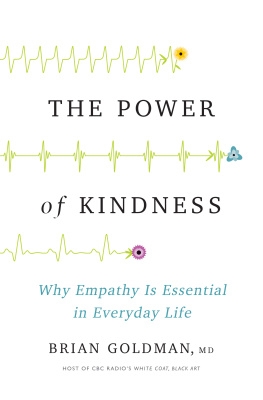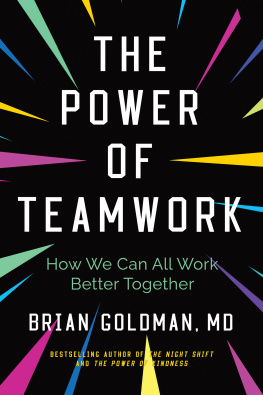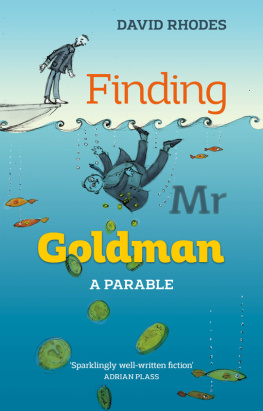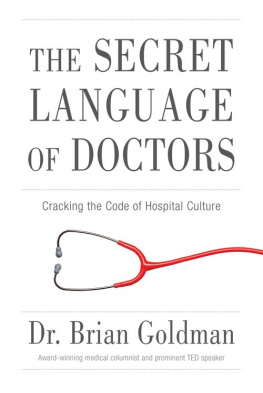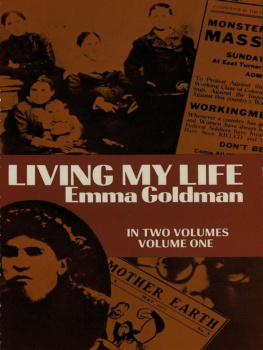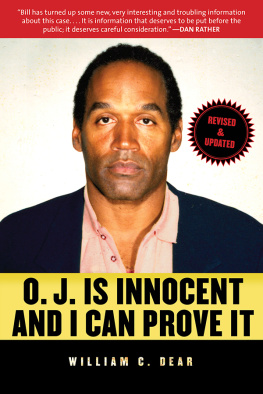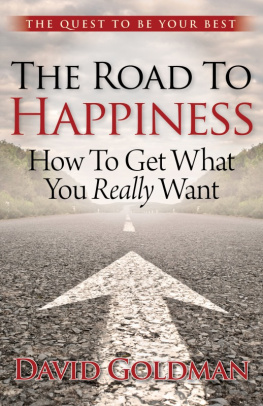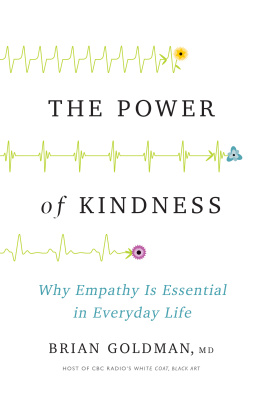Am I a kind soul?
As an existential question, its right up there with Why do I exist? and How do I know if Im doing the right thing?
Up until a few years ago, the question of kindness was way down on my bucket list. I had what I believed were much more important things on my mind, such as being a competent emergency room physician. Like many of my colleagues, I worried about every mistake I made on the job, big and small. Medicine is a profession where every error carries the risk of serious consequences. I worried that my lifelong battle with insomnia, coupled with unnatural shift work, would eat into my competence. I worried about being an older physician in a young persons environment like the ER.
To those worries, add being the host of a national radio show. Its prestigious and exciting, but its another place where getting a fact or an attitude wrong can cause instant disapprobation. Sometimes, my main comfort is knowing that even my worst mistakes on the air are not immediately hazardous to anyones health.
At home, I was preoccupied with being a good partner to Tamara and father to my children, Kaille and Alexander. Over the years, I have focused my energies on being a solid provider to my family. For my kids, I was preoccupied with things like making sure they had the technological tools and the tutors they needed to succeed. I always remembered to encourage them to talk about their feelings, especially the ones that troubled them.
As the son of aging parents, I saw it as my duty to make sure they got astute medical care. When my mother was admitted to a long-term care facility with end-stage Alzheimers disease, I visited her as often as I could. When she could no longer feed herself, I took turns spoon-feeding her with my sister Joanne. When my dad felt crushing bitterness at having to move his wife of nearly 60 years into the nursing home, I tried to comfort him while absorbing some of his pain.
My parents are both gone now. And that has left me with time to ask the question: Am I a kind soul?
From what Ive told you about myself, I sound pretty kind. So how come Im asking? Because doubt has crept into me. I have felt this way for a long time. That Im too stressed, too busy, too preoccupied with the errors I make at work and in life, too anxious and too self-absorbed to think enough about others to be kind to them.
And Im not alone. As I look around me, I see the same problem everywhere.
You order a decaf latte. The barista repeats your order word for word. A minute later, hes forgotten it and asks you to repeat it. When you finally pick up your beverage, one sip tells you he got it completely wrong.
A beleaguered woman struggles to lift a heavy printer onto the service desk of a store that sells computer equipment. The printer doesnt work. The manager looks relieved when he points out that her service contract has expired.
An unaccompanied minor on a commercial flight misses a connection. For several panic-stricken hours, the child is missing. The ending is happy, but what the parents remember most about the ordeal is the call centre representative advising them not to worry.
What these and many stories have in common is lack of empathy.
It seems everyone has a painful story or two to tell. A recent study by University of Indiana psychologist Sara Konrath found empathy among todays college students has declined by about 40 percent compared to their peers 20 or 30 years ago, with the biggest drop after 2000.
Theres sympathy and theres empathy, and many people confuse the two. Sympathy is a gesture of acknowledgement or commiseration for someone experiencing misfortune, ranging from a business setback to the death of a loved one. Think cards, flowers, or the oft-used phrase Sorry for your loss. To extend sympathy, you dont need to know what people are going through, and you dont need to feel what they feel. Empathy, on the other hand, is the ability to use your imagination to see things from the point of view of another person, and to use that perspective to guide your behaviour.
Jean Decety, a cognitive neurosciences researcher at the University of Chicago, says that empathy is made up of several components. One is affective or emotional empathy, which refers to the capacity to feel the emotions of others. A mother who winces when her toddler trips and falls is feeling her childs pain physically. But you dont have to be a mother to experience the emotions of others. Anxious people make me feel anxious; its as if their mood is transmitted to me like a virus. Researchers refer to this phenomenon as emotional contagion.
Emotional or affective empathy is an instinctive capacity that is baked into our DNA. It exists inside the most primitive centres of the brain, and it appears early in a childs life. By the age of 12 months, Decety writes, infants begin to comfort victims of distress, and by 14 to 18 months, children display spontaneous helping behaviors.
Emotional empathy is what motivates us to help others. On September 2, 2015, the body of Aylan Kurdi, a three-year-old Kurdish boy, washed up on a Turkish beach, and the photo of his lifeless body caused outrage around the world. Aylan was only one of more than 3 million refugees trying to flee persecution and sectarian violence in Syria. Yet somehow people who saw that one photo empathized so profoundly with the boys fate that thousands of people donated money and sponsored refugees.
For a surgeon, emotional empathy is a double-edged sword. You want the surgeon who takes out the cancer in your chest to be motivated to help you; you do not want the surgeon to be so wracked with empathy for your pain that she hangs up her scalpel.
The second component is called cognitive empathy, which means having a sense of how another person is feeling. Cognitive empathy is also referred to as perspective taking because it involves the ability to see things from the perspective of another person. Unlike emotional empathy, which originates in the primitive brain, cognitive empathy comes from the brains higher centres where, as Decety puts it, motivation, memories, intentions, and attitudes influence the extent of an empathic experience. Developmental psychologists also refer to cognitive empathy as theory of mind, a term coined in 1978 by David Premack and Guy Woodruff to describe the ability of humans and some primates to predict the motivations and intentions of others.
Simon Baron-Cohen, professor in developmental psychopathology and director of the Autism Research Centre at the University of Cambridge, refers to theory of mind as mind reading. He says that humans mind read all the time, effortlessly, automatically, and mostly unconsciously. Baron-Cohen has devoted much of his career to studying people with autism, a condition in which the ability to construct a theory of mind is greatly impaireda condition that the eminent psychologist refers to as mindblindness. People with schizophrenia and attention deficit hyperactivity disorder (ADHD), and cocaine and alcohol users, may also suffer from mindblindness. They have abnormalities within the structures or the circuitry of the brain that account for this deficit.
These days, it seems that many people with decidedly normal brains behave as if they were incapable of imagining what its like to be in another persons shoes.
Take this example: A 47-year-old woman walks up to a government service kiosk. Her husband, a recent arrival from another country, has died suddenly of a brain aneurysm. The woman wants to take her husbands body back to his birthplace, a process complicated by the fact he and his wife have applied for permanent resident status but havent yet received it. Far from showing kindness, the clerk acts irritated. From the clerks point of view, each encounter is supposed to take a fixed number of minutes, and this one could take an hour or more to sort out, which will drag down her productivity rating. At that moment, she seems unable to imagine the pain that the grieving widow is going through.

